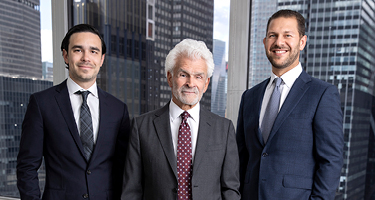Lawyers thrive under pressure—until they don’t.
Starting January 1, 2025, New York’s sweeping changes to workers’ compensation recognize a crucial truth: mental injuries from extraordinary work-related stress are real, compensable, and affecting lawyers more than ever.
For New York lawyers, this isn't just policy—it's personal.
High stakes, unrelenting deadlines, emotionally charged client cases, and the ceaseless demand for perfection compound daily, contributing to staggering rates of anxiety, depression, and burnout within the profession.
With the legal field facing a well-documented mental health crisis, this expansion couldn’t be more timely or necessary.
For attorneys accustomed to shouldering their clients’ burdens, it’s a rare acknowledgment that their own mental well-being matters too—and it might just help reshape a profession notorious for burnout.
What Is "Extraordinary" Work-Related Stress?
The legal profession has always been demanding, stressful, and downright exhausting. But until now, nobody really acknowledged that those pressures could break more than just billable-hour records.
Under New York’s amended workers’ compensation law, lawyers experiencing extraordinary work-related stress can finally claim compensation for mental injuries. But what exactly qualifies as "extraordinary" in a profession already synonymous with stress?
Now the law recognizes that not all trauma is physical, and not all stress comes from a single, catastrophic event.
Lawyers, often trapped in an endless cycle of case deadlines, client demands, ethical burdens, and emotional strain, face their own kind of chronic emergency. This amendment recognizes that fact explicitly.
Extraordinary doesn’t mean feeling annoyed by a cranky client or frustrated by a tough negotiation. It means stress so substantial, unusual, or prolonged that it seriously disrupts your mental health.
Think less "rough day at the office" and more "I can’t get out of bed because of the sheer weight of the next trial."
Or consider the lawyer who spends weeks absorbing the trauma of emotionally devastating family law or child custody cases, day after day, until anxiety or depression becomes crippling.
A Groundbreaking Amendment for Lawyer Mental Health
Under the new provision, cumulative stress—not just a single traumatic moment—is covered.Chronic conditions such as Generalized Anxiety Disorder (GAD), Major Depressive Disorder, or PTSD resulting from cumulative stress are specifically relevant. For instance, a lawyer consistently managing emotionally taxing cases involving domestic abuse, child neglect, or wrongful convictions may develop sustained anxiety or depressive disorders.
Under the new law, if a clinical diagnosis is directly attributable to their work conditions, such conditions would likely meet the criteria for extraordinary work-related stress.
This recognition expands eligibility beyond isolated events, underscoring the reality that continuous psychological pressures can be as harmful as any physical injury.
Lawyers aren’t exactly known for discussing feelings, but we’ve got to face the facts. A recent American Bar Association survey painted a bleak picture: 28% of lawyers battle depression, nearly 20% experience clinical anxiety, and over 11% had suicidal thoughts in the previous year.
Think about what the average lawyer deals with: impossible caseloads, meticulous court filings, ceaseless client demands, and an unrelenting obligation to deliver perfect outcomes. The emotional toll from high-stakes trials—especially for criminal defense lawyers or prosecutors—is brutal.
Still, claiming a mental injury isn't simple.
The lawyer must clearly establish the direct link between their professional duties and their declining mental health. The evidence required is significant: detailed medical documentation, expert psychological evaluations, and demonstrable proof connecting workplace pressures to the injury.
But the critical point here—and this is what makes the amendment groundbreaking—is that cumulative exposure to extreme professional stress now explicitly qualifies as a basis for a workers’ compensation claim.
Strategic Implications and Potential Complications for Legal Employers
New York’s revised workers’ compensation law isn’t just a victory for attorney mental health—it’s a wake-up call for firms across the state. Like it or not, these changes will have immediate strategic implications.
Let’s start with the obvious: more attorneys will file mental stress claims. Given the stresses baked into the profession, firms should expect—and prepare—for a noticeable uptick in these claims from associates, partners, paralegals, and support staff alike. Firms must immediately update their internal policies with clear, responsive procedures addressing mental health claims, emphasizing prompt, confidential, and supportive responses to employees raising these concerns.
Proactive policies are key because the administrative costs and litigation risks tied to mental injury claims are about to spike dramatically. Unlike straightforward physical injuries, mental health claims require nuanced investigations, extensive documentation, and expert psychological assessments—each claim potentially becoming a miniature litigation battle itself. The evidence can be subjective, and the stakes, both financial and reputational, can escalate rapidly.
To address this proactively, firms should establish dedicated internal review teams composed of HR professionals and external mental health experts. Such teams could confidentially assess claims at the early stages, providing mediation or recommending immediate support services to attorneys before conditions escalate.
Firms might implement periodic wellness check-ins or anonymous surveys to detect stress-related issues earlier. By intervening proactively, firms not only reduce litigation risk but also send a powerful message to their attorneys that their mental health is taken seriously—potentially reducing the stigma of seeking help in the first place.
Firms must also grapple with "workers’ compensation exclusivity," a legal principle stating that if an injury is compensable under workers’ comp, employees generally can’t turn around and sue their employer separately for emotional distress or related damages in court. That exclusivity sounds protective for employers—and in some ways, it is—but it also comes loaded with complications.
Practically, this exclusivity could redirect or limit certain employment litigation claims. For example, consider an associate experiencing severe anxiety caused by a toxic work environment or alleged discriminatory treatment. Under the amended law, if that associate successfully establishes their mental injury as extraordinary workplace stress covered by workers’ comp, the firm might leverage the exclusivity doctrine as a shield against related emotional distress claims filed in civil court. The outcome could mean fewer civil suits for emotional damages but more administrative battles within the Workers’ Compensation Board.
But exclusivity has its limits. Intentional tort claims aren't blocked by the workers’ comp exclusivity rule. If a lawyer credibly alleges intentional harmful behavior by firm leadership or colleagues, those claims can still land squarely in civil court. Suddenly, employers find themselves managing parallel processes: the workers’ compensation claim in one forum, intentional tort allegations in another. Double the battles, double the headaches.
So, What’s a Firm to Do?
It starts with prevention. Investing in targeted mental health programs isn’t charity; it’s smart business.
Firms should offer confidential counseling services, resilience training, and meaningful stress-management programs specifically tailored to lawyers’ unique pressures. These aren’t just good optics—they significantly reduce the likelihood of stress reaching debilitating levels, protecting attorneys and firm profitability alike.
Beyond preventive measures, firms must train managers and senior attorneys to recognize early warning signs of mental distress, respond compassionately and effectively, and document issues accurately. Supervisors need the tools and awareness to proactively manage workloads, set realistic expectations, and foster a culture where mental health conversations are normalized—not stigmatized. If firms want fewer claims, they’ll need better leadership.
Lawyers—especially ambitious associates or junior partners—may hesitate to file mental health claims, fearing career repercussions or stigma. A critical task for firms now is to establish trust. Clear confidentiality policies, coupled with visible actions reinforcing those policies, are essential. Attorneys need reassurance their claims won't trigger retaliation or sideline career advancement. Without that trust, attorneys might either suffer in silence or escalate matters externally, multiplying the firm's risks exponentially.
Time to Lead
New York’s workers’ comp expansion isn’t some abstract, bureaucratic tweak—it’s a timely recognition that mental health injuries within our profession are just as real, serious, and deserving of attention as physical ones.
Lawyers don't just argue cases; they carry emotional burdens heavy enough to break even the strongest among us.
Firms that proactively tackle these challenges—updating policies, investing in mental health initiatives, and creating cultures where mental well-being isn’t an afterthought—will do more than just avoid litigation. They’ll retain talent, build loyalty, and ultimately set the standard for what the practice of law should be: rigorous but humane, challenging yet sustainable.
Leadership at all levels must now step up and openly champion mental health initiatives—not just behind closed doors, but publicly and consistently. Firms should communicate clearly that attorney wellness is integral to their mission, not merely an optional benefit.
Public commitments, regular leadership communications emphasizing mental health, and visible support of attorneys who file claims are crucial steps. It's not just the right move ethically; it's essential strategically. The firms that embrace this change wholeheartedly won't just lead the legal industry into the future—they'll shape it, setting a standard of care and compassion that could redefine professional success.

































